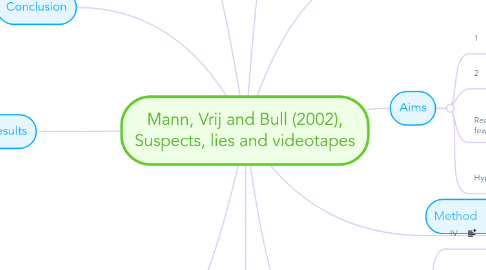Mann, Vrij and Bull (2002), Suspects, lies and videotapes
by Lindsay Round


1. Procedure
1.1. Police asked to recall...
1.2. To check truths and lies
1.2.1. Advantage
1.3. Selected truths and lies...
1.3.1. Advantage
1.4. Final videotape
1.4.1. Duration
1.4.2. Clips
1.4.2.1. Total number
1.4.2.2. Truths
1.4.2.3. Lies
1.4.2.4. Per participant
1.4.2.5. Duration
1.5. Coding behaviours
1.5.1. Number of coders
1.5.1.1. Advantage
1.5.2. The coders were naive
1.5.2.1. Advantage
1.6. To get a score
1.6.1. Quantitative data
2. Results
2.1. Significant differences in...
2.1.1. 1
2.1.2. 2
2.2. Individual differences occurred
3. Conclusion
3.1. Supports
3.1.1. Blinking especially important
3.2. Individual differences
3.3. To establish lying
3.4. Lying
4. Evaluation
4.1. Advantage - ethics
4.2. Limitation - interviewers
4.3. Limitation - comparisons
4.4. Limitation - reliability
4.5. Advantage - reliability
4.6. Advantage - ecological validity
4.7. Advantage - quantitative data
4.8. Limitation - ethics
4.9. Usefulness
5. Context
5.1. Previous research on lying...
5.1.1. Findings
5.1.1.1. Examples
5.1.2. Type of study
5.1.2.1. Problems x3
6. Aims
6.1. 1
6.2. 2
6.3. Reasons why there may be fewer nervous behaviours
6.3.1. 1
6.3.2. 2
6.4. Hypothesis
7. Method
7.1. Strength
8. Design
8.1. IV
8.2. DV
8.2.1. Gaze aversion
8.2.2. Blinking
8.2.3. Head movements
8.2.4. Self-manipulations
8.2.5. Illustrators
8.2.6. Hand/finger movements
8.2.7. Speech disturbances
8.2.8. Pauses
